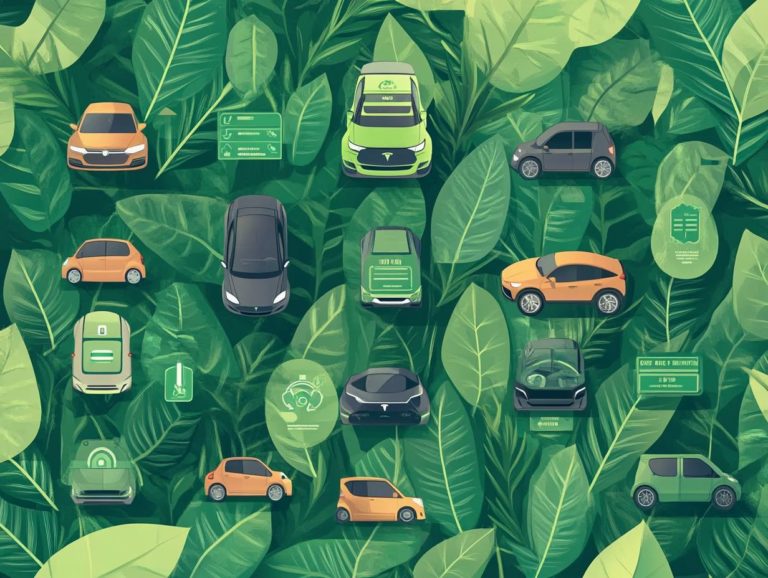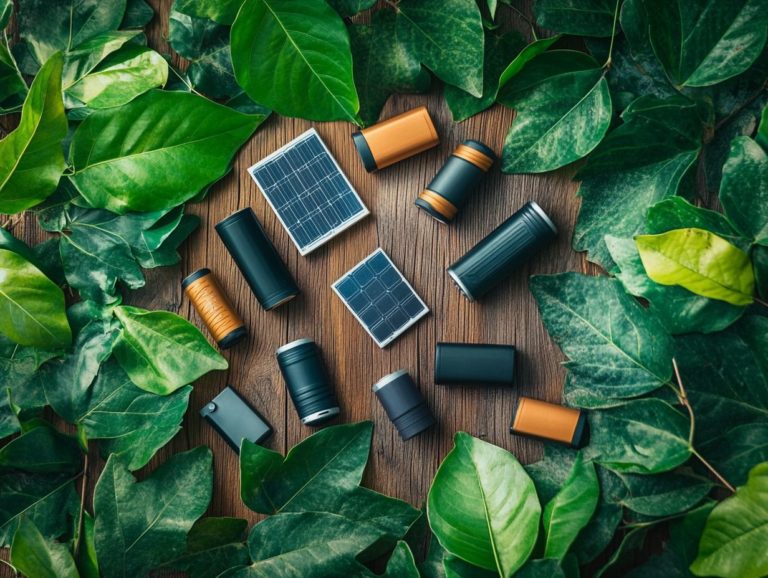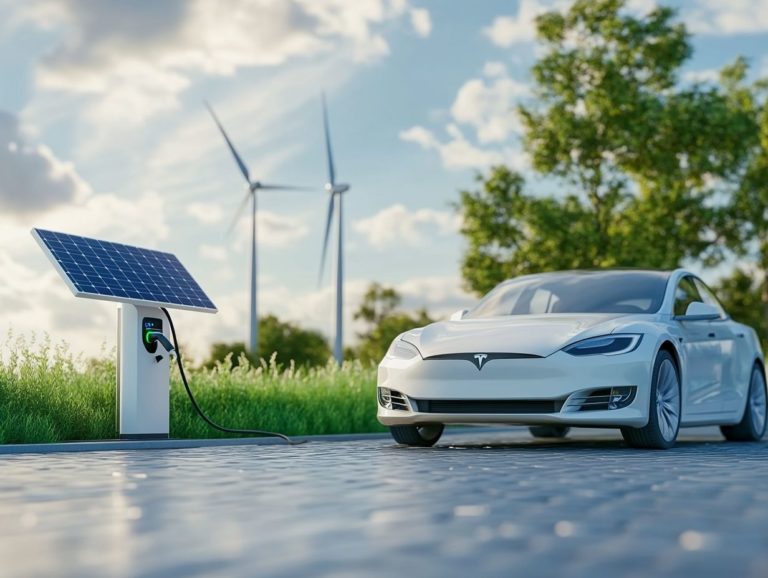The Impact of EVs on Water Resources
Electric vehicles (EVs) are becoming popular for a sustainable future. It s crucial to understand their impact on water resources.
This article looks at global water scarcity. It also examines how producing and using EVs affects water usage and quality.
Discover innovative solutions to reduce water consumption in the EV industry. Consider the long-term effects these vehicles may have on our vital water resources.
Embark on this journey as you navigate the vital intersection of technology and environmental stewardship.
Contents
- Key Takeaways:
- Current State of Water Resources
- Environmental Impact of EVs on Water Resources
- Solutions for Sustainable Water Usage in the EV Industry
- Long-Term Effects of EVs on Water Resources
- Frequently Asked Questions
- 1. How do electric vehicles impact water resources?
- 2. Do electric vehicles use more water than traditional cars?
- 3. Are there any benefits to water resources from the use of electric vehicles?
- 4. How can the production of electric vehicles affect water resources?
- 5. What steps are being taken to minimize the impact of electric vehicles on water resources?
- 6. Will the increase in electric vehicles have a significant impact on water resources?
Key Takeaways:

- Producing EVs consumes a lot of water, worsening global water scarcity.
- Reducing water use and recycling are essential for sustainable water use in the EV sector.
- The long-term impact of EVs on water resources hinges on improving water management and predicting future water use.
Overview of Electric Vehicles and Water Usage
Electric vehicles (EVs) represent a groundbreaking solution for lowering carbon dioxide emissions and tackling climate change. However, their environmental impact goes beyond merely reducing reliance on fossil fuels.
The water consumption involved in manufacturing EVs, particularly in producing lithium-ion batteries, presents significant challenges and raises important concerns about sustainability and resource management.
Industry leaders like Tesla, Nissan Leaf, and BMW 320d face increasing scrutiny regarding their water usage and its implications for both water resources and environmental sustainability, as highlighted in various sustainability reports and the Corporate Sustainability Due Diligence Directive.
The production of lithium-ion batteries requires a lot of water during mining, refining, and manufacturing. For instance, extracting lithium from saline brines a primary source of this critical element can use hundreds of thousands of gallons of water per ton extracted, adversely impacting local ecosystems and communities.
Take Tesla’s Gigafactory, which aims to mass-produce batteries sustainably; it still contends with water limitations in Nevada, a region where water supply is already under stress. Similarly, the Nissan Leaf s production involves significant water usage during assembly, while the BMW 320d requires water-intensive processes for materials like aluminum and other metals.
These examples highlight an urgent need for the automotive sector to adopt efficient water management strategies now. This ensures a sustainable future while simultaneously meeting the soaring demand for EVs.
Current State of Water Resources
The current state of global water resources is indeed alarming. You may notice increasing water scarcity and stress impacting various regions, including mineral-rich areas like the Andean Mountains and the Democratic Republic of the Congo.
Here, mining activities can significantly contribute to groundwater contamination. As electric vehicles rise in popularity, it’s essential for you to understand how these challenges intersect with water resources. This knowledge is vital for promoting sustainable growth.
Global Water Scarcity and Stress
Global water scarcity is a pressing concern, with over two billion individuals living in water-stressed regions. This stark reality highlights the urgent need for sustainable practices, especially in industries like electric vehicles, which rely on materials often sourced through water-intensive processes.
Moreover, environmental concerns linked to heavy metals and artisanal mining practices can severely impact local water quality and availability. As climate change and population growth continue to exert pressure on water resources, it s crucial for the electric vehicle sector to act now. Understanding the implications of supply chain decisions is vital.
With the rising demand for lithium, cobalt, and other critical materials, the need for water in their extraction and processing escalates. This presents a tough challenge that needs immediate attention, as conventional mining techniques can deplete local water sources and contaminate nearby waterways.
To mitigate these impacts, the industry must find innovative solutions such as adopting sustainable mining practices, implementing water recycling systems, and investing in alternative materials that reduce water consumption. By doing so, we can contribute to building a more resilient and environmentally friendly approach.
Environmental Impact of EVs on Water Resources
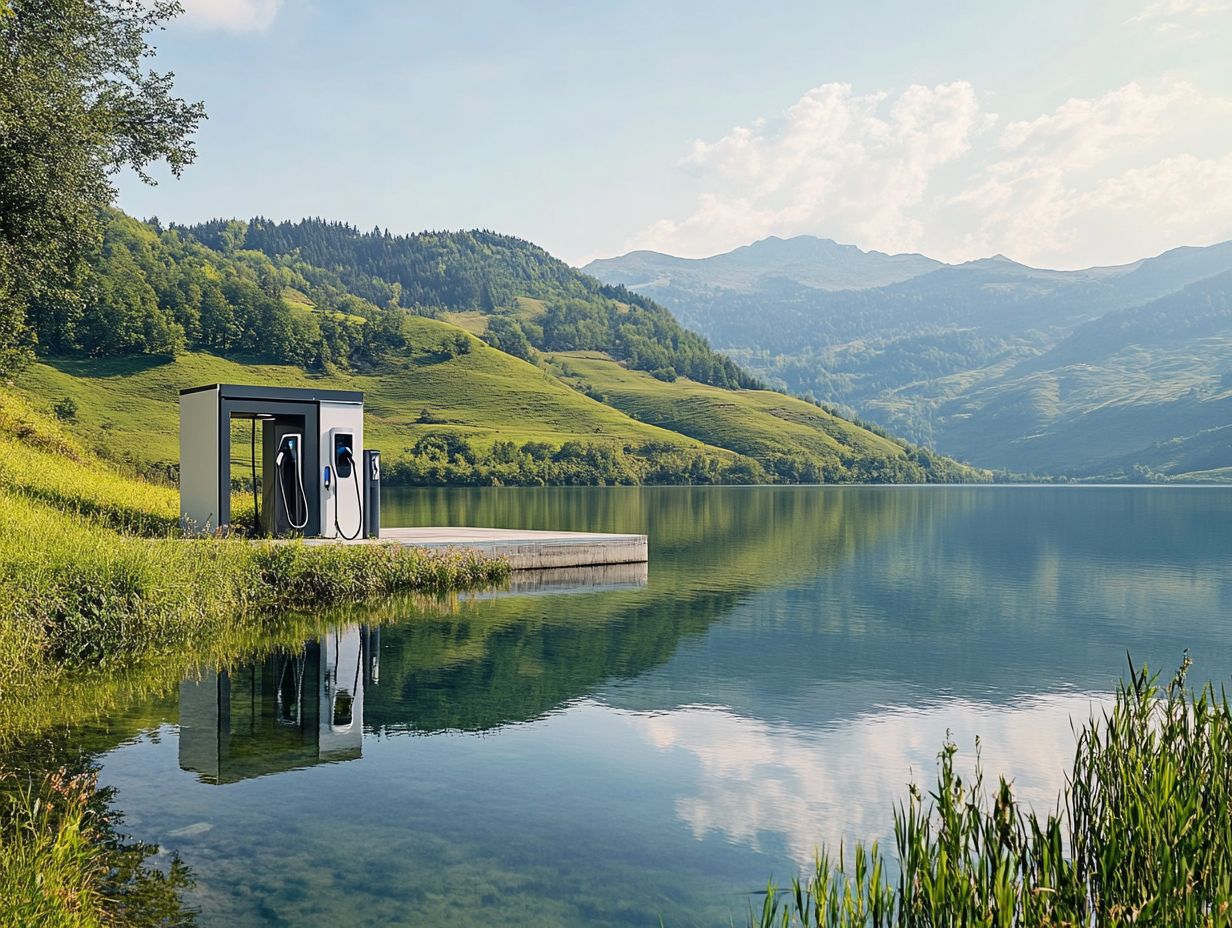
The environmental impact of electric vehicles on water resources involves various aspects, from manufacturing processes to the extraction of critical materials like lithium and cobalt. As demand for lithium-ion batteries rises, understanding these impacts including potential groundwater contamination from mining is crucial for fostering a sustainable future.
Water Usage in EV Production
Water usage in electric vehicle (EV) production is a critical factor that deserves attention. Substantial amounts of water are needed for battery production and related manufacturing processes.
Research shows that producing lithium-ion batteries can consume up to 400,000 liters of water for every ton produced. This staggering figure emphasizes the need to reevaluate current practices, especially in regions facing water scarcity.
Sustainability reports from leading automotive companies document these concerning statistics and showcase best practices within the industry. By embracing the Corporate Sustainability Due Diligence Directive, manufacturers can implement targeted measures to improve water efficiency and reduce consumption, paving the way for a more sustainable future in EV production.
Effects of EVs on Water Quality
The impact of electric vehicles on water quality presents a complex landscape, with risks of groundwater contamination stemming from mining processes essential for materials like lithium and cobalt. These risks raise serious environmental concerns regarding heavy metals, making it vital to understand the implications for the long-term sustainability of our water resources.
Mining for these valuable minerals often disrupts local ecosystems, releasing toxic byproducts into waterways. This contamination can harm aquatic life, leading to declines in fish populations and altering natural habitats. Communities relying on these water sources for drinking and agriculture may face significant health risks.
To address these challenges, advocating for stricter regulations on mining practices, promoting the recycling of materials, and investing in cleaner extraction technologies is essential. This way, the shift to electric vehicles can occur without jeopardizing the quality of vital water resources.
Solutions for Sustainable Water Usage in the EV Industry
To tackle the urgent challenges of water consumption within the electric vehicle (EV) industry, considering innovative solutions that promote sustainable water usage is crucial. This includes embracing advancements in water recycling technologies and practices.
Companies such as H2O Innovation and Evergy are leading the charge in integrating sustainable methods into water management throughout the EV manufacturing process. This highlights the significant potential for transformative change across the industry.
We must support these initiatives to ensure a sustainable future for the EV industry.
Efforts to Reduce Water Consumption
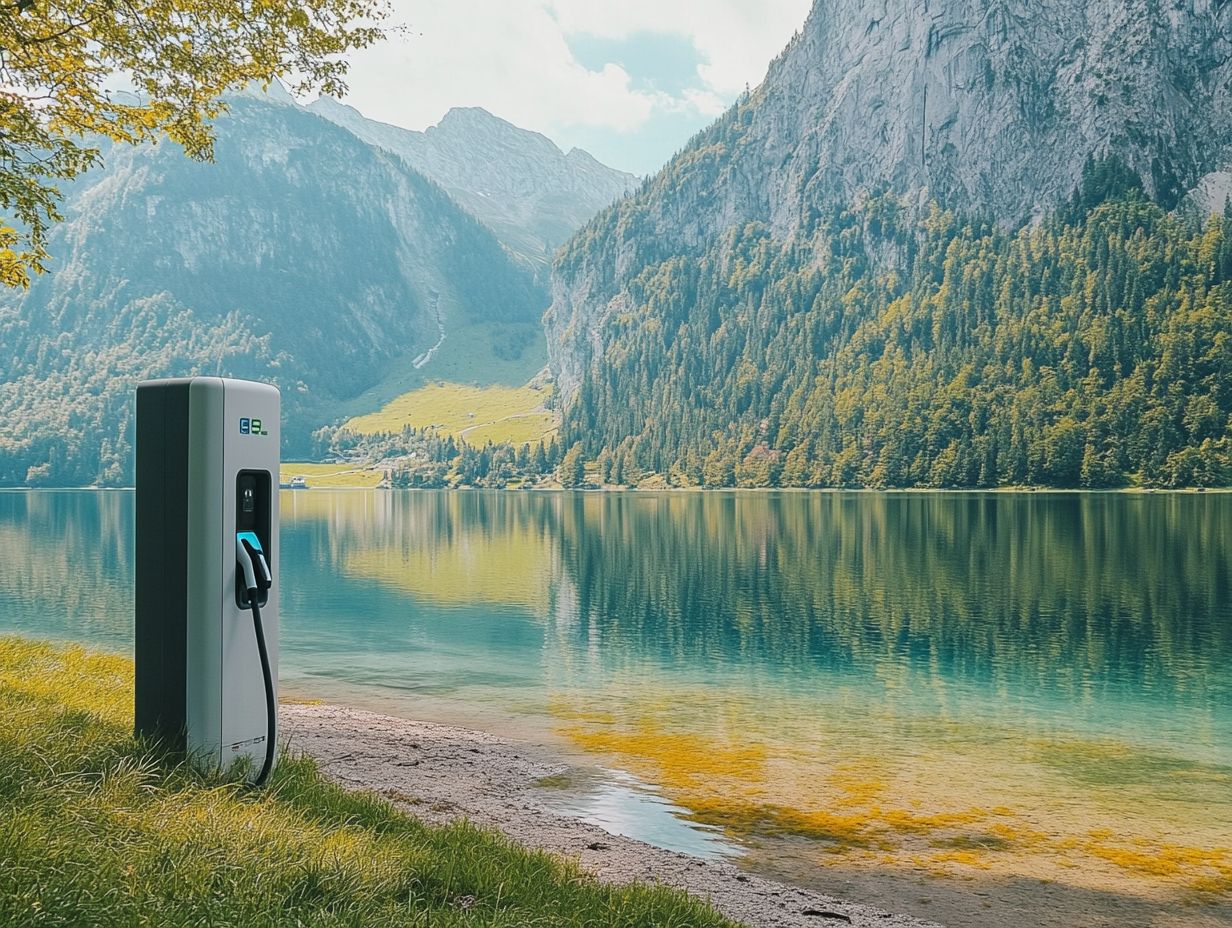
Reducing water consumption in electric vehicle production is vital as the industry faces increasing demands for enhanced sustainability practices. Implementing frameworks like the Corporate Sustainability Due Diligence Directive can drive significant changes in how your company approaches water usage during manufacturing.
Many organizations are utilizing innovative water recycling technologies and optimizing cooling systems to minimize waste. By adopting best practices such as rainwater harvesting and investing in systems that recycle water, you can significantly reduce overall water consumption.
Collaboration with suppliers to ensure sustainable sourcing of materials is becoming increasingly common. Regulatory frameworks guide these practices while promoting transparency in reporting, urging you to monitor and disclose your water footprint.
This collective effort can enhance your reputation while leading to long-term cost savings and improved compliance with evolving environmental standards.
Innovations in Water Recycling and Reuse
Innovations in water recycling and reuse are essential for your commitment to the sustainability of the electric vehicle (EV) industry. By adopting these practices, you can minimize your environmental impact while optimizing resource use. Companies like H2O Innovation and Evergy are leading the charge in this area, paving the way for a greener future in EV production.
These advancements include state-of-the-art filtration systems and models that recycle water dramatically, reducing consumption during manufacturing. For example, Tesla has integrated a rainwater harvesting system at their Gigafactory, enabling them to recycle water for battery production and decrease their reliance on fresh water sources. Similarly, Ford is exploring innovative treatment technologies to repurpose wastewater in their plants.
These initiatives enhance water sustainability and reinforce your dedication to environmentally responsible practices in the EV sector.
Long-Term Effects of EVs on Water Resources
Understanding the long-term impacts of electric vehicles (EVs) on water resources is essential for influencing sustainable practices and policies within the industry.
Research continues to reveal the nuances of water usage and quality. Sustainability reports are becoming essential tools for monitoring progress and ensuring accountability as the industry advances.
Predictions for Future Water Usage and Management
Predictions for future water usage and management in the electric vehicle (EV) industry highlight an urgent need for strategies aimed at minimizing environmental impact and fostering sustainability. The IEA Global EV Outlook 2024 emphasizes the increasing pressure on water resources and outlines essential steps for effective management moving forward.
As the demand for electric vehicles rises, it s crucial to understand how production processes such as battery manufacturing and the mining of essential materials can stress local water supplies. Studies suggest that the industry must embrace innovative recycling technologies and explore alternatives, like desalination, to tackle these challenges.
Working with local governments and stakeholders to implement responsible water usage policies and invest in sustainable practices could pave the way for a more resilient future. By proactively addressing these issues, you not only ensure compliance with upcoming regulations but also enhance your reputation as a leader in environmental stewardship.
Frequently Asked Questions

1. How do electric vehicles impact water resources?
Electric vehicles don’t directly harm water resources, but making and disposing of their batteries can affect water due to mining.
Embrace these innovative solutions today!
2. Do electric vehicles use more water than traditional cars?
No, electric vehicles do not use more water than traditional cars.
In fact, they use significantly less water because they do not require any water for fuel combustion or engine cooling.
3. Are there any benefits to water resources from the use of electric vehicles?
The use of electric vehicles positively impacts water resources.
They do not emit pollutants, which helps improve air and water quality in cities, ultimately benefiting local water sources.
4. How can the production of electric vehicles affect water resources?
The production of electric vehicles can indirectly impact water resources.
This occurs through the extraction and processing of materials used in their batteries, which can lead to water pollution and depletion of water resources in the areas where these materials are sourced.
5. What steps are being taken to minimize the impact of electric vehicles on water resources?
Car manufacturers and governments are taking exciting steps to protect our water resources.
These include using sustainable materials in battery production and implementing responsible disposal processes for used batteries.
6. Will the increase in electric vehicles have a significant impact on water resources?
With the rise of electric vehicles, we have a unique chance to protect our precious water resources!
While the use of electric vehicles is growing, the impact on water resources is not expected to be significant.
With proper management and responsible production and disposal processes, the impact can be minimized and water resources can be protected.


